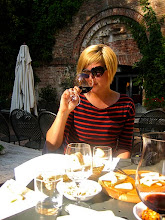For those looking for some structure or point to this post, I would suggest you stop reading. Really I'm just obsessively checking my e-mail every five minutes, waiting for a response that will probably not come for several days. To pass the time, as well as to procrastinate on my writing my lesson plan, I'm here, writing whatever comes to mind.
As mentioned earlier, I've started my apartment search. Well, I may have found one. I'm loath to go into any detail about the place, lest I jinx myself, so I'll just say that the apartment (well, it's more like a house) is located in a good area (Palermo Soho), with cool roommates (judging from one brief meeting), and, more importantly, within my price range. I would have my own private bathroom and (the best part!) a huge terrace right outside my room. The woman living there is in her late 20's and is a graphic designer; there's also a girl from London. I've already told her that I would take the room if it's fine by her, so now I'm just waiting for her to respond. As much as I have loved living with Delfina and Beatriz, I'm a bit anxious to move into a more permanent place, so that I can actually unpack and feel as though this is my life here, rather than a long vacation.
I taught my second lesson on Thursday, and this time it was a high intermediate class with about eight students. This is the highest level that we teach, and it was an entirely different experience from my first class, in which I taught low beginners. This time around, I had to do relatively little in terms of explaining a specific grammar point - while the students could not speak fluently, they could express themselves very well and enjoyed doing so. In fact, at several points during the lesson I had a hard time getting a word in. The theme of my lesson was "the workplace," so we discussed adjectives that could describe one's boss and co-workers ("manipulative" was one of the first words the students yelled out) as well as the atmosphere. Overall, I was happy with how the lesson progressed, and my trainer had some constructive criticism which I can work from for my next lesson. My initial fear was that I would stand up in front of the class and become a bumbling idiot, as I always seem to get nervous when I speak in front of people, no matter how small the group. But so far this has not been a problem - my trainer even said that I seemed calm, confident, and had an excellent teaching presence. One student even came up to me after class and asked for my e-mail in case she wanted private lessons! Granted, I think she asked this of everyone, but it still made me feel great. So with my nerves behind me, it's time to set my expectations higher, and try to incorporate the different techniques we have been learning into my lessons. I'll have two lessons a week for the next two weeks, which is a fair amount of practice before I'm thrown into a real classroom.
Random observation: Buenos Aires invariably smells of dog shit/garbage, both of which are ubiquitous, (though not in a Neapolitan way) or asado, which, to put it briefly, is Argentine barbecue. The former obviously makes me want to gag, the latter makes me hungry. The odd thing about the asado aroma is that it wafts into my window at any time of the day. On 7.30 pm on a Sunday, or 10 am on a weekday, and even as late as 1 am. Argentines are just plain crazy about asado. And if you could smell what I'm smelling right now, you would probably understand why. I'm still adjusting to the Argentine eating schedule: they tend to eat dinner around 10 pm, but more often than not later. I have no problem doing this if I'm eating out, but for those nights in when I have no plans, I still like to eat around 8. Beatriz has asked me several times if I eat dinner at all, as she often comes home after I have eaten. Argentine kids are also on a different schedule, staying up late to eat with their parents. As I was getting ready to go out this past Saturday, I could hardly hear my music over the screams of the kids next door. This was at 11.30 at night. By the time I left around midnight, they were still going strong. As I passed by their apartment, I saw a sign with "Feliz Cumpleaño" written in a six year old's scrawl. When I turned six, I'm pretty sure I passed out at about 5 pm. Eating cake and opening presents is awesome at any age, but it tends to wipe most kids out. Or at least I thought. Maybe Argentines start their kids on mate (a green tea-esque drink which all Argentines, regardless of social status, drink at all times of the day) at an early age, or maybe it's just longer naps, but something has got to be keeping these kids going. And I would love to know what it is so I can get in on it.
Well, I suppose I have procrastinated long enough. I never know how to end these things...years of schooling makes me feel as though I must have some sort of conclusion. But screw that.
And...scene.
